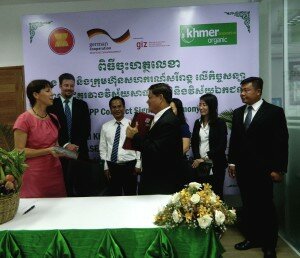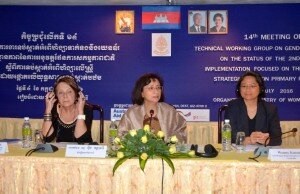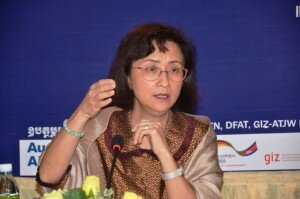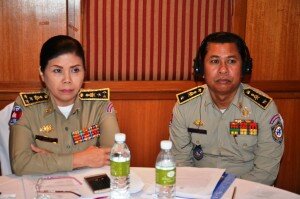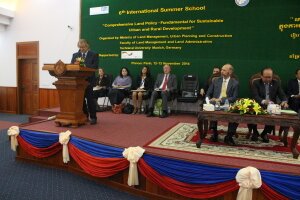PRESS RELEASE – Boosting organic production and consumption in Cambodia
02 September 2016
Germany enters a partnership with Khmer Organic Cooperative Co., Ltd to promote production schemes for organic agriculture and link producers into ASEAN markets
The Deutsche Gesellschaft fuer Internationale Zusammenarbeit (GIZ) GmbH on behalf of the German Federal Ministry for Economic Cooperation and Development (BMZ), enters a cooperation agreement with the Khmer Organic Cooperative Co., Ltd (KOC) until February 2018, to establish two organic certified demonstration farms, focusing on fruits and vegetables. The prepared farms later on will be used as a national organic training center for Cambodia. More >>>
PRESS RELEASE – Boosting organic production and consumption in Cambodia
02 September 2016
Germany enters a partnership with Khmer Organic Cooperative Co., Ltd to promote production schemes for organic agriculture and link producers into ASEAN markets
The Deutsche Gesellschaft fuer Internationale Zusammenarbeit (GIZ) GmbH on behalf of the German Federal Ministry for Economic Cooperation and Development (BMZ), enters a cooperation agreement with the Khmer Organic Cooperative Co., Ltd (KOC) until February 2018, to establish two organic certified demonstration farms, focusing on fruits and vegetables. The prepared farms later on will be used as a national organic training center for Cambodia. Additionally, the cooperation strengthens regional market linkages and establishes local organic supply networks. To assure continued knowledge transfer, best practices and knowledge of organic agriculture will be shared in trainings with other farmers and interested institutions. On top, efforts to raise consumer awareness will be made.
“The partnership creates a great opportunity for us to boost organic fruit and vegetable production among farmers, but also reach consumers through a marketing campaign”. – Sotheara, Founder of KOC
For GIZ, this partnership shall increase usage of food standards among Cambodian farmers and overcome existing challenges that prevent agricultural businesses from implementing food standards, including poor agricultural practices especially when it comes to chemical inputs of smallholders, and lack of access to premium ASEAN markets for organic produce.
Background
The agriculture and food industry is one of the most important economic sectors in Cambodia (33.5% of overall GDP in 2013 according to the World Bank) and almost employs more than half of the country’s population. However, currently in Cambodia fruits and vegetables are only rarely certified in accordance with current standards for good agricultural practices (GAP) and organic agriculture. The lack of certification of agricultural products hinders Cambodia to trade its agricultural products. With increasing economic integration within ASEAN, standards for food production and processing will be attributed even more importance.
About “Khmer Organic Cooperative Co.,Ltd (KOC)”
Khmer Organic Cooperative’s vision is to promote organic vegetables and fruits for consumers at an affordable price, equip farmers with knowledge and essential skills to grow organic produce on their own, and work towards establishing a sustainable environment free of chemicals and genetically modified seeds.
Organic fruits and vegetables not only taste better but they are important for good health. Khmer Organic Cooperative strives to find markets for our farmers’ produce in order to provide them with earning and providing sustainable practices in the country.
KOC has two organic farms, the first farm is located at Picnic Resort along National Road 4 and the second farm in Chhroy Svay, Sre Amel district, Koh Kong province. These two farms are using organic farming methods of growing fruits and vegetables combined with modern concepts of preparing the soil, planting and harvesting products and the organic farms will become educational centres for farmers and others.
More information on KOC can be found on www.khmerorganiccooperative.com
About the project “Standards in South East Asian Food Trade” (SAFT)
SAFT is a GIZ-supported project that supports the ASEAN Secretariat on the development and implementation of regional food standards for good agricultural practices (ASEAN GAP) and organic agriculture (ASOA). The objective is to verifiably apply both standards in the ASEAN region, particularly in the production and processing of fruits and vegetables. The project is commissioned by the German Federal Ministry for Economic Cooperation and Development (BMZ).
About GIZ
GIZ is an experienced service provider working on behalf of the German Government to support achieving its objectives in the field of international cooperation. We offer demand-driven, tailor-made and effective services for sustainable development.
More information on GIZ can be found on www.giz.de
Contact Details
Sovann Pisey THLANG Borany Suy
Director, KOC Administrative Assistant-Public Relation
GIZ Office Cambodia
E: E:
T: +855-12-510-005
Resource Persons
Sotheara IENG Ra Ten
Founder, KOC Technical Advisor, GIZ
E:
PRESS RELEASE – New Push from the Ministry of Women’s Affairs to Activate Government Response to End Violence against Women
PHNOM PENH, Cambodia, 4th July 2016 – The Ministry of Women’s Affairs today led a special meeting with representatives from 15 line ministries and civil society organizations to boost the implementation and monitoring of the Second National Action Plan to Prevent Violence against Women, the key national policy to address intimate partner violence and sexual violence in Cambodia. At the meeting, a new reporting system was established within the Government to increase accountability from line ministries and identify and tackle challenges in their responses to Violence against Women.
In her address, Cambodian Minister of Women’s Affairs Dr. Ing Kantha Phavi said, “As we speak here today women are being subjected to abuse and violence or even killed by their spouses and partners across our country. I hope that the new working methods and simplified reporting mechanism endorsed today will help line ministries to reactivate efforts and mobilize more human and financial resources to end this unacceptable human rights violation.”
Speaking at the meeting, Ms. Wenny Kusuma, Country Representative of UN Women, said “We are marking today the half way timeframe in the implementation of the National Action Plan to Prevent Violence against Women (2014-2018) with mixed feelings because much more needs to be done. According to a national survey commissioned by UN Women and WHO and launched by end last year, one in five Cambodian women aged 15-64 who have ever been in a relationship have experienced physical and/or sexual violence by an intimate partner in their lifetime. Another UN survey published in 2013 found that almost half of the Cambodian male perpetrators never face legal consequences. All this data is alarming and shows that response to Violence against Women from the Cambodian Government is far from being adequate enough.”
During her remarks, Dr. Ludgera Klemp, Counsellor of the German Embassy, said “Germany has supported the Ministry of Women’s Affairs and four NGOs (Cambodian Women’s Crisis Center, Transcultural Psychosocial Organization, Legal Aid Cambodia and Banteay Srei) to enhance coordination, quality and accessibility of services for women and girls victims of gender-based violence. In 2014 and 2015, over 4,000 women and girls survivors of intimate partner violence and sexual violence and their children received services in Siem Reap and Kampong Thom provinces. Violence against Cambodian female migrant workers and to trafficking in women and girls still remain as critical priorities. “
At the meeting, four ministries (Ministry of Women’s Affairs; Ministry of Education, Youth and Sports; Ministry of Culture and Fine Arts; and Ministry of Information) also explained their progresses and challenges in their work to promote behavioral change of citizens to prevent Violence against Women before it happens. In addition, representatives from the Provincial Departments of Women’s Affairs from Siem Reap and Kampong Thom and from four NGOs presented some good practices and lessons learnt about their responses to Violence against Women and Girls at sub-national level.
The meeting was organized under the framework of the Technical Working Group on Gender-Based Violence, created in 2012 by the Ministry of Women’s Affairs, supported by GIZ and UN Women –with funds from the German and Australian Governments- and comprised by line ministries, civil society organizations and development partners.
***
Editors
Follow the Ministry of Women’s Affairs of Cambodia in our social media here: https://www.facebook.com/mowa.gov.kh
***
For further information please contact:
- Mr. Phon Puthborey, Information Department, Ministry of Women’s Affairs, Email: ; Mobile: (+855) 129 905 19
- Mr. Rodrigo Montero Cano, Communications Advisor, Access to Justice for Women program, GIZ, Email: ; Mobile: (+ 855) 12 92 37 71
Ms. Mariken Bruusgaard Harbitz, Communication Officer, UN Women Cambodia; Email: ; Mobile: +855 (0)12 210 325
Development between Production and Protection: International Summer School Addresses Land Policy Issues
PHNOM PENH - The 6th International Summer School, Comprehensive Land Policy – Fundamental for Sustainable Urban and Rural Development was held by the Ministry of Land Management, Urban Planning and Construction (MLMUPC), jointly organized with the Royal University of Agriculture (RUA), and the Technical University Munich (TUM), in partnership with GIZ.
The summer school reached an unprecedented scale, attracting about 360 participants with representatives from Bangladesh, Cambodia, China, Germany, Lao PDR, Nepal, the Philippines, Serbia, Thailand and Vietnam. Aiming for balanced perspectives, speakers included local and international NGOs, Cambodian and German academe, government representatives of Cambodia and the region, and bilateral and multilateral development organisations.
After a well-received welcome speech by the German Ambassador to Cambodia, H.E. Baron Marschall von Bieberstein on the land reform, senior minister H.E. Im Chhun Lim, opened the summer school, pointing out, among many other aspects, the comprehensive character of the national land policy.
The summer school was structured into different themes:
- Relevance of Land Policy in the Global and International Context: Addressed inputs on sustainable development goals (SDGs), Global Land Indicator Initiative, Voluntary Guidelines on the Responsible Governance of Tenure (VGGT) and on land policy efforts in other countries in the region. While land policy has to address the needs of all, marginalized or vulnerable groups require explicit and targeted consideration.
- Land Policy and Marginalized Groups: Discussed housing rights of the urban poor, indigenous land rights as well as gender-sensitive land policy, with inputs of representatives from UN Women, the Cambodia Indigenous Youth Association (CIYA), the Asian Coalition for Housing Rights (ACHR) and government.
- Cross-Cutting Topics of Land Policy: Presented concepts of ecosystem services and impacts of economic corridor development. Different perspectives on the Cambodian White Paper on Land Policy and its implementation complemented the themes addressed.
H.E. Dr. Holger Magel summarized key messages from the summer school in his closing speech, including an acknowledgment of the comprehensiveness of the White Paper on Land Policy, its quality in an international context and the political signals of commitment to its objectives. Likewise, he emphasized the need to focus on implementation and its review and evaluation, on participation, information, capacity development and cooperation – all key means for achieving an implementation that lives up to the spirit of the policy: a sustainable rural-urban development between production and protection.
For further information, all presentations is available: http://giz-cambodia.com/6th International Summer School 2014
![]()
